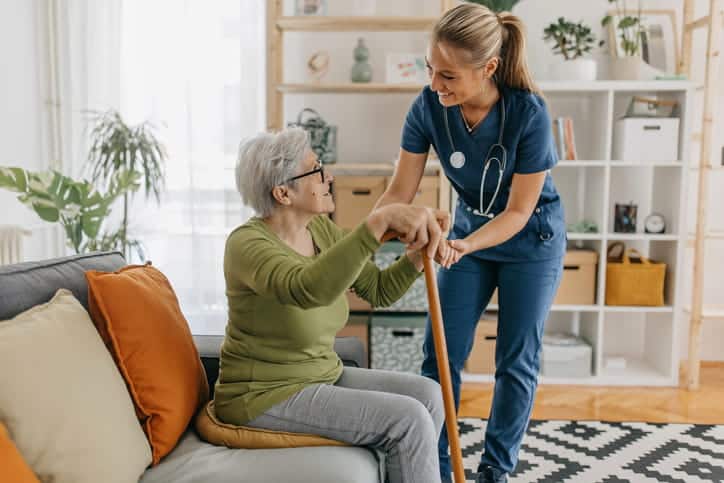Many serious health issues can arise as people age. Internally, multiple changes occur as people get older. For example, the human body retains less fluid, which causes spinal discs to contract and stiffen. Externally, it’s common for seniors to have gray hair and wrinkles.

The changes that come with aging increase the risks of severe health issues. For example, 33% of seniors aged 65 to 85 have hearing loss, which rises to 50% for seniors over 85. Hearing loss has multiple symptoms, including loss of balance, which makes a person with hearing loss more likely to suffer a fall.
As people age, they have a higher risk of developing severe health issues such as Alzheimer’s, atherosclerosis, cancer, diabetes, and high blood pressure. The increased risks of critical health issues are one of the key reasons routine health checkups are crucial for seniors.
What Is the Importance of Routine Health Checkups?
Routine health checkups are a crucial part of healthcare, offering several benefits.
Vaccinations
Checkups are an effective way to ensure your vaccinations are up to date.
Establishing Baseline
Seeing your primary care provider regularly enables your doctor to note changes to your baseline, which is your typical health state. Once your doctor has a clear picture of your health, they can identify any changes in subsequent checkups. Your doctor can use your baseline to help you set appropriate health goals and use checkups to monitor your progress.
Achieving your health goals can help you avoid health problems. It can help increase your lifespan and improve your quality of life, enabling you to continue enjoying your favorite activities.
Encourages Healthy Lifestyle
Regular checkups also promote healthy lifestyle choices. Knowing your doctor will be checking your weight and overall health in a matter of months can give you the motivation you need to maintain a healthy diet and exercise routine.
Early Detection
Your doctor may also identify changes to your baseline that raise concerns. Promptly identifying these changes allows for early detection of health issues and swift treatment, reducing the risks of complications. Early detection can also lower the cost of treatment, making routine checkups the most economical way to manage your health.
Peace of Mind
If you’re concerned about a potential health problem, seeing your doctor for a checkup can alleviate your fears. Worrying can cause health issues with your heart, muscles, kidneys, immune system, and digestive system. It can also exacerbate existing health issues, such as asthma, and increase your risk of stroke. Routine health checkups can eliminate these health risks for the elderly and reassure you that you’re healthy.
Why Is It Important for Senior Citizens To Have Regular Health Checkups?
Elderly health checkups offer the same benefits others receive from routine health checkups. Additionally, routine checkups allow their doctors to evaluate their medications and determine whether they’re producing the desired results. Routine checkups allow seniors to refill prescriptions or adjust their medications to improve their health.
Since senior citizens are at increased risk of chronic health conditions, routine checkups allow their doctors to use treatments to prevent health issues from worsening.
Should Senior Citizens Have Early Medical Checkups?
Some seniors may benefit from early checkups, particularly if they have concerns or are experiencing new or worsening symptoms. Early checkups promote early detection of new health issues and allow doctors to identify changes to existing conditions so they can adjust treatments as needed.
Monitoring a Senior’s Health
Family members may struggle to monitor a senior family member’s health. Younger adults are often busy with work and may be raising a family, making it hard to check in on a senior family member as often as they’d like. Consequently, many family members are often surprised by severe changes in a senior family member’s condition. They may not realize their family member has stopped paying bills and has difficulty going out to refill prescriptions, buy groceries, and visit friends. They may also not realize their family member has health issues until the symptoms are severe.
One way to ensure seniors get the care they need is for them to move to an assisted living or skilled nursing facility.
Assisted Living Facilities
Assisted living facilities offer social interactions, activities, fitness programs, and personal care in an environment customized for seniors’ needs. An assisted living facility can be the best living environment for those struggling with social isolation, loneliness, and health issues.
Skilled Nursing Facilities
Skilled nursing facilities can offer all that assisted living facilities provide, plus expert onsite medical care. The medical services provided at skilled nursing facilities include:
- Behavioral therapy
- Infectious disease treatment
- Memory care for Alzheimer’s or dementia
- Occupational therapy
- Physical therapy
With licensed nurses and doctors as part of the staff team, skilled nursing facilities monitor patients receiving care, allowing them to identify and respond to new symptoms and health concerns swiftly.
How Haven Health Can Help

Haven Health offers assisted living and skilled nursing facility services. Suppose you’re a senior concerned about monitoring your health or struggling with loneliness and isolation. Haven Health provides a safe home tailored to your unique needs. Our team is available to answer your questions and show you what we offer if you’re ready to move to a home where you can receive the personal, emotional, and physical health support you need.
Contact Haven Health to find out more about our assisted living and skilled nursing facilities.
Sources:
Hearing and Balance Symptoms and Conditions. (2024).
How Worry Affects Your Body. (2023).
Seniors and Hearing Loss. (2024).
Why Discovering Your Health Baseline Really Matters. (2023).
Wolcherink, M., et al. (2023). Health Economic Research Assessing the Value of Early Detection of Cardiovascular Disease: A Systematic Review.